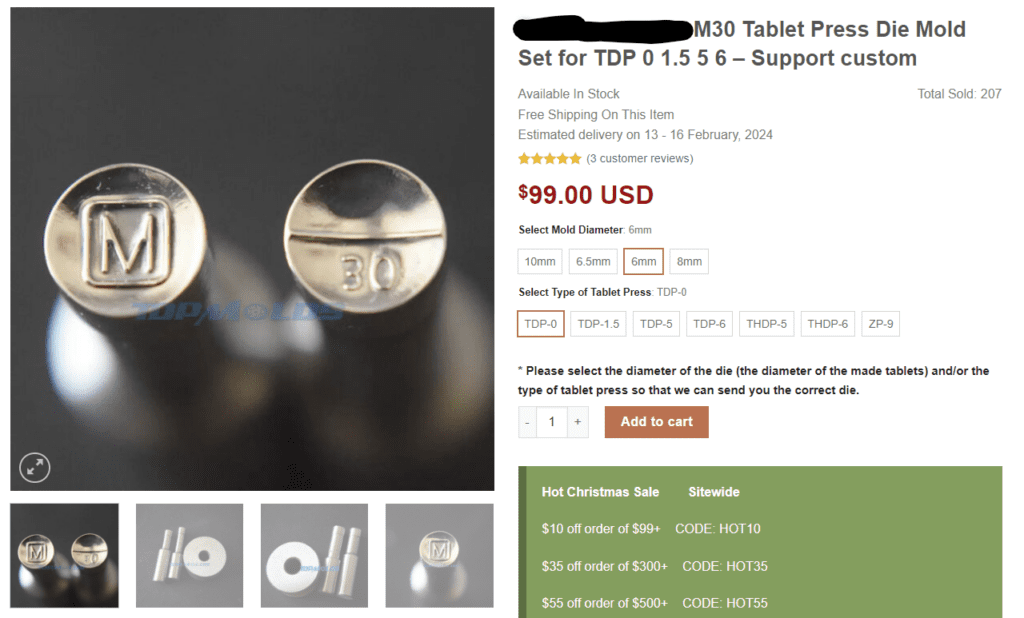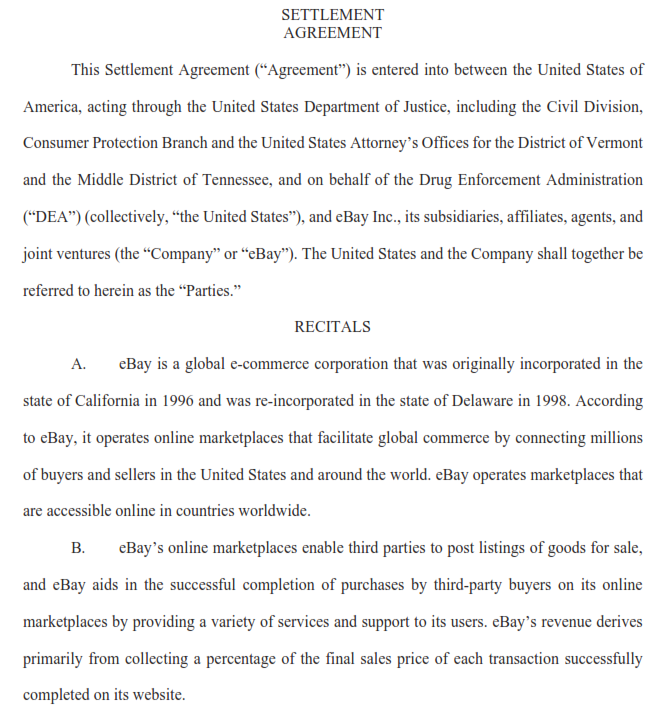Explainer: eBay and the Department of Justice settle over pill press sales
On January 31, 2024, eBay and the U.S. Department of Justice announced a settlement: In return for not prosecuting eBay for alleged violations of the Controlled Substances Act (CSA) related to the sale of pill presses and encapsulating machines since 2015, eBay will pay $59 million and strengthen compliance programs around the sale of these machines on their platforms.
In a statement, eBay reiterated that the company “expressly denies the DOJ’s allegations and the settlement does not include any admission of wrongdoing.”
What's the takeaway?
The Partnership for Safe Medicines has monitored the online pill press market for years, which means we have witnessed eBay’s efforts to successfully suppress the sale of these products on its platform. In light of this settlement, it is likely that other platforms that could be used to sell pill presses and encapsulating machines may ban these sales rather than undertake the burden of compliance. In the future, pill press sales will likely be confined to overseas platforms that are more difficult for U.S. regulators to reach.
This appears to be the first time that the U.S. Department of Justice has applied the “broker” role in this statute to an online marketplace for pill press or encapsulating machine transactions. This follows the Biden administration’s novel use of Treasury sanctions against Chinese pill press manufacturers in 2023.
Media Inquiries: Shabbir Imber Safdar, Executive Director, Partnership for Safe Medicines at editors@safemedicines.org
Read the settlement eBay agreed to in January.
Frequently asked questions
The law regarding pill press transactions says that anyone who is a broker for an international transaction involving a pill press has recordkeeping and reporting obligations. According to the settlement, ebay did not meet those requirements:
During the Relevant Time Period, transactions involving pill-making machines occurred on eBay’s online marketplace, including sales of pill presses that were shipped to buyers in the United States...eBay did not comply with the CSA’s reporting and recordkeeping obligations in connection with any transactions of pill-making machines on the platform....eBay failed to maintain certain records for transactions involving pill-making equipment, as required by 21 U.S.C. § 830(a). Because eBay did not verify purchasers’ identifications, eBay did not record the type of identification information required by the CSA. Despite the thousands of transactions that occurred on its online marketplaces, eBay did not report any transactions involving pill-making machines to the DEA, as required by the CSA, 21 U.S.C. § 830(b)(1)(D).
eBay did not admit any wrongdoing in the settlement.
Criminals who make counterfeit medicine—both controlled substances disguised as pills and fake therapeutics—use the machines to press ingredients into familiar pill shapes. Fake oxycodone or Xanax made with fentanyl or other dangerous drugs are a significant source of fatal poisonings that are killing Americans. Counterfeiters also manufacture fake therapeutics, such as blood thinners with no active ingredient. Pills like these endanger Americans by failing to treat or under-treating health conditions that can be deadly, like blood clots.
For a longer explanation, see “What’s a pill press?” below.
Federal law requires anyone who “manufactures, distributes, imports, or exports” pill presses and encapsulating machines to verify the identities of their buyers, keep records of the transaction for two years, and make those records available to the U.S. Attorney General. The statute includes anyone who acts as an international broker or trader for a transaction involving this equipment. We have never heard of eBay itself making, buying, or selling pill presses, so we suspect the DOJ asserted that eBay was a broker.
In recent years, eBay has taken extensive steps to stop sales of pill press machines and pill molds on their platform, including banning sales of the equipment on their site (“Encouraging illegal activity policy”). In 2021, eBay created a regulatory portal that allows law enforcement such as the DEA to flag and remove listings for pill presses and molds, as well as communicate with buyers and sellers on their own without any steps required by eBay.
Attachment A of the settlement mentions significant compliance steps that eBay has taken. The settlement requires that eBay maintains these compliance programs in the future.
eBay’s efforts appear to have been successful, because PSM has found it difficult to find pill presses or pill molds for sale on eBay for several years.
We suspect that domestic online marketplaces will decide that compliance requirements to host such listings are more trouble than they are worth, and follow eBay’s footsteps and ban sales of this category of products entirely. But banning the listings is only one step. One must also effectively enforce the ban on users, and take the many other steps eBay has already put into place as described in their settlement. eBay’s settlement is likely the end of pill press sales on all platforms with a significant U.S. presence, including Amazon, Walmart, Facebook Marketplace, etc.
This is an inventive law enforcement technique in the ongoing problem of dealing with illegal pill presses. We congratulate the Administration for taking this step. It’s not the first time the Biden administration attacked the pill press problem. In 2023 it took the novel step of imposing Treasury sanctions on Chinese companies involved in the manufacture and sale of pill presses and pill molds.
Deadly fake pills, whether they are fake opioids that contain fentanyl, or pills that are supposed to be blood thinner but are just chalk, kill thousands of people in the U.S. every year. To make them, you need a machine that presses powder ingredients into the shape of a pill. A simple one looks like this machine with the wheel in the photo. There’s actually a second pill press on the floor, to the left of the larger one. These were seized in January 2024 by police in Meridien, Mississippi.
What's a pill press mold?
A pill mold is a small piece of metal that presses the powder ingredients into a pill shape. Here’s an image of a pill mold PSM found for sale online on January 30, 2024. It’s for the most commonly faked pill, the oxycodone M30 pill.

Screenshot of website selling pill molds (PSM)
Where do criminals buy pill presses and molds?
They buy them from a manufacturer that makes them outside the U.S., either through the vendor’s website or an online marketplace. Usually pill presses and molds are shipped internationally through the U.S. mail.
While CBP catches a lot of them, clearly some get through. Not every package can be inspected and law enforcement continues to catch criminals using pill presses.
What are other items needed to make a pill?
If you’re making something with an active ingredient, such as fentanyl or methamphetamine, you can buy that on the black market in person or online. However if the criminal is making a placebo version of therapeutic medicine, such as a blood thinner, they don’t need an active ingredient at all.
For all pills, you need to buy other legal but inert ingredients such as filler powder, colored dyes, and binding agents that hold the mixture together. These are typically not regulated products, and can be bought without resorting to subterfuge.
More about pill presses
States in pink indicate that law enforcement has found at least one pill press making illicit pills. Red triangles are for specific seizure incidents, January 2023 to the present. This map is live and interactive on our page about illicit pill presses.
PSM has been documenting the criminal use of pill presses since 2016, near the time Americans started to realize fake prescription pills made with fentanyl had emerged in the U.S. PSM maintains an archive of pill press seizures by law enforcement. Consult these resources to learn more about the central role these machines play in the counterfeit medicine trade and issues around regulating them
- Illegal Pill Presses: An Overlooked Threat To American Patients, 2019
(A joint project with the NABP and NADDI) - Illegal Pill Presses: An Overlooked Threat To American Patients, 2021 update (A joint project with NADDI)
- Do you know what a pill press Is? (infographic, 2019)
- Pinboard feed of pill press-related news (ongoing)
- Map of pill press seizures in the United States

